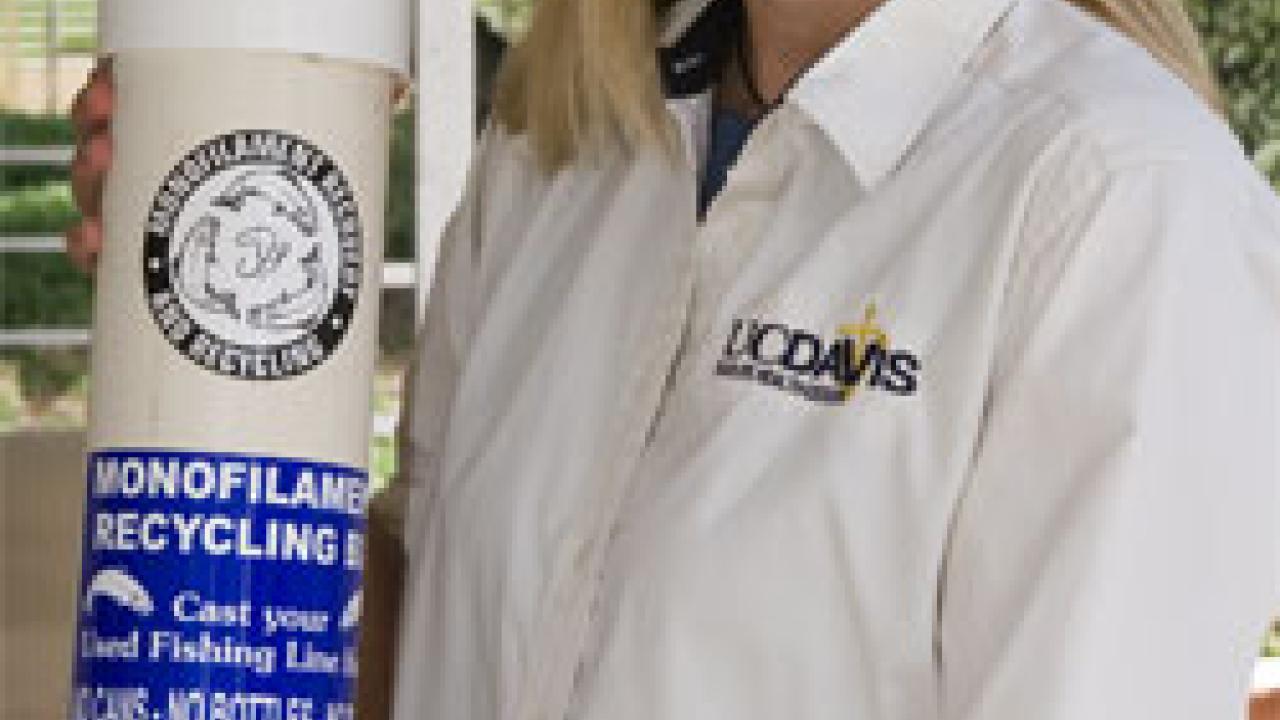Seeing gulls or pelicans with fishing hooks in their mouths or fishing line wrapped around their legs is an all too common sight on California beaches. Thanks to a new UC Davis project, these types of injuries soon should be reduced.
Next week, the California Lost Fishing Gear Recovery Project will start a yearlong effort to remove discarded fishing hooks and line from pier pilings, and establish fishing-line recycling stations on the piers, in an effort to make the coastal ocean safer for wildlife as well as people.
"Fishing-line-related injuries are a problem for many of our coastal wildlife species," said Kirsten Gilardi, executive director of the SeaDoc Society, a program of the UC Davis Wildlife Health Center. "Our goal is to remove as much of it as we can from around fishing piers, and then make it easy for anglers to dispose of their used hooks and line properly in the future."
From Santa Cruz to the Mexican border, trained volunteer scuba divers will use knives and shears to remove accumulated fishing line from the pilings at 16 public-access fishing piers. Working in close cooperation with the cities and ports that manage the piers and with local nonprofit organizations, SeaDoc will install custom bins at each pier to encourage anglers to discard their unwanted hooks and line in the bin instead of into the water. Collected monofilament will be recycled.
Cleanups will take place in March through June 2007 on piers in these locations: Santa Cruz, Monterey, Avila, Goleta, Santa Monica, Manhattan Beach, Redondo Beach, San Pedro, Seal Beach, Huntington Beach, Newport Beach, San Clemente, Oceanside, Ocean Beach in San Diego and Imperial Beach.
The $200,000 California Lost Fishing Gear Recovery Project is funded by the National Fish and Wildlife Foundation and the Marine Debris Program of the National Oceanic and Atmospheric Administration (NOAA). The project was established with grants from those organizations and by the California Ocean Protection Council and State Coastal Conservancy.
To date, working closely with commercial fishermen, the California Lost Fishing Gear Recovery Project has retrieved nearly 10 tons of fishing gear from around the Channel Islands. The pier cleanups represent the project's first efforts taking place on the mainland.
This project was previously called the California Derelict Fishing Gear Removal Project.
Editor's note: Media events will be scheduled in March through June at seven of the 16 piers (see list). Two events are next week. Future events will be scheduled as weather and ocean conditions permit; notice will be sent to local media a few days before each event. At events, media can interview project director Kirsten Gilardi and see volunteer divers at work removing fishing gear from those seven piers. Fishing gear already collected will be on display, as well as fishing-line recycling bins. (While telephone and e-mail interviews with Gilardi can be done at any time, the only availability on piers will be these media events.)
Media events are planned for:
- Monterey Municipal Wharf (No. 2): 10 a.m., Tuesday, March 20
- Avila Beach Pier: 10 a.m., Thursday, March 22
- Goleta Pier
- Manhattan Beach Pier
- Cabrillo Pier in San Pedro
- Newport Beach Pier
- Oceanside Pier
Media Resources
Kirsten Gilardi, Wildlife Health Center, 530-752-4896, kvgilardi@ucdavis.edu
